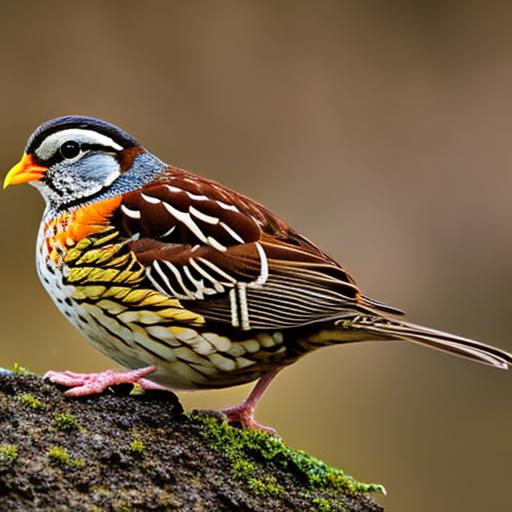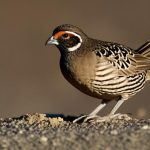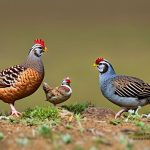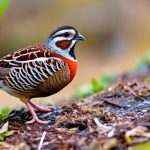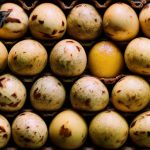Quail keeping has gained popularity in Singapore in recent years due to the small size of the birds, their low maintenance requirements, and the potential for a sustainable source of eggs and meat. Quails are also known for their ability to adapt to various climates, making them suitable for the tropical climate of Singapore. Keeping quails can be a rewarding experience for both hobbyists and those looking to start a small-scale quail farming business.
Quails are small, ground-dwelling birds that belong to the pheasant family. They are known for their fast growth rate, high egg production, and delicious meat. In Singapore, quail keeping can be a viable option for individuals with limited space, as quails can be housed in small enclosures and do not require extensive land or resources. Additionally, quails are relatively quiet birds, making them suitable for urban and suburban settings. With the right knowledge and resources, quail keeping in Singapore can be a fulfilling and sustainable endeavor.
Key Takeaways
- Quail keeping is a popular hobby in Singapore, with enthusiasts enjoying the benefits of fresh eggs and meat.
- When choosing quail species for Singapore’s climate, it’s important to consider the hot and humid weather, making Japanese quail a popular choice.
- Setting up a suitable quail enclosure in Singapore requires proper ventilation, protection from predators, and adequate space for the quail to move around.
- Feeding and nutrition for quail in Singapore should include a balanced diet of commercial quail feed, supplemented with fresh greens and protein sources.
- Health and disease management for quail in Singapore involves regular monitoring for common ailments such as respiratory infections and implementing biosecurity measures to prevent outbreaks.
Choosing the Right Quail Species for Singapore’s Climate
When it comes to choosing the right quail species for Singapore’s climate, it is essential to consider the temperature and humidity levels of the region. In Singapore, the climate is tropical, with high temperatures and humidity throughout the year. Therefore, it is crucial to select quail species that can thrive in such conditions. Japanese quails (Coturnix japonica) are one of the most popular species for quail keeping in Singapore due to their ability to adapt to warm climates. They are also known for their high egg production and fast growth rate, making them a suitable choice for both egg and meat production.
Another quail species that can thrive in Singapore’s climate is the Bobwhite quail (Colinus virginianus). While they are native to North America, Bobwhite quails have been successfully raised in tropical regions like Singapore. They are known for their resilience and adaptability to various climates, making them a suitable choice for quail keepers in Singapore. When choosing the right quail species, it is essential to consider factors such as temperature tolerance, egg production, and meat quality to ensure the success of quail keeping in Singapore’s climate.
Setting Up a Suitable Quail Enclosure in Singapore
Setting up a suitable quail enclosure in Singapore is crucial for the health and well-being of the birds. Quails require a secure and comfortable environment that provides protection from predators, extreme weather conditions, and other potential hazards. When designing a quail enclosure in Singapore, it is essential to consider factors such as space requirements, ventilation, lighting, and sanitation. The enclosure should also be designed to allow easy access for cleaning, feeding, and monitoring the quails.
For quail keepers in Singapore, it is important to provide adequate space for the birds to move around and exhibit natural behaviors. The enclosure should be spacious enough to accommodate the number of quails being kept and should include areas for nesting, feeding, and dust bathing. Additionally, proper ventilation is essential to prevent heat stress and respiratory issues, especially in Singapore’s tropical climate. Adequate lighting is also important to regulate the birds’ reproductive cycles and ensure optimal egg production. Lastly, maintaining good sanitation practices within the enclosure is crucial for preventing disease outbreaks and promoting the overall health of the quails.
Feeding and Nutrition for Quail in Singapore
Feeding and nutrition play a crucial role in the health and productivity of quails in Singapore. A well-balanced diet is essential for supporting growth, egg production, and overall vitality of the birds. In Singapore’s tropical climate, it is important to provide quails with a diet that meets their nutritional requirements while also considering factors such as heat stress and humidity. A typical quail diet should consist of high-quality commercial feed supplemented with fresh greens, grains, and protein sources.
Commercial quail feed formulated for layers or broilers is readily available in Singapore and provides essential nutrients such as protein, vitamins, and minerals necessary for optimal growth and egg production. Additionally, offering fresh greens such as lettuce, spinach, and kale can provide added vitamins and fiber to the quails’ diet. Grains such as millet, corn, and oats can also be offered as supplemental treats to provide variety and enrichment for the birds. Protein sources such as mealworms or small insects can be included in the diet to support muscle development and overall health.
In addition to providing a well-balanced diet, it is important to ensure that quails have access to clean water at all times, especially in Singapore’s warm climate where dehydration can occur quickly. Proper hydration is essential for supporting egg production and preventing heat stress in quails. By providing a nutritious diet and access to clean water, quail keepers in Singapore can ensure the health and productivity of their birds.
Health and Disease Management for Quail in Singapore
Maintaining the health of quails is essential for successful quail keeping in Singapore. In a tropical climate like Singapore’s, quails may be more susceptible to certain diseases and health issues related to heat stress and humidity. Therefore, it is important for quail keepers to be proactive in preventing diseases through proper management practices and regular health monitoring.
One of the key aspects of disease management for quails in Singapore is maintaining a clean and sanitary environment within the quail enclosure. Regular cleaning of the enclosure, including removing droppings, replacing bedding, and disinfecting feeders and waterers, can help prevent the spread of diseases and parasites. Additionally, providing proper ventilation within the enclosure can help reduce humidity levels and prevent respiratory issues in quails.
Another important aspect of health management for quails in Singapore is monitoring for signs of heat stress. Quails are sensitive to high temperatures and humidity, which can lead to heat exhaustion and decreased egg production. Providing shade within the enclosure, offering cooling methods such as misting or fans, and ensuring access to fresh water can help prevent heat stress in quails.
In addition to proactive measures, it is important for quail keepers in Singapore to have a basic understanding of common diseases that may affect quails and their symptoms. Being able to recognize signs of illness early on can help prevent the spread of diseases within the flock and allow for prompt treatment when necessary. By implementing proper management practices and staying vigilant about the health of their birds, quail keepers in Singapore can ensure a healthy and thriving flock.
Breeding and Raising Quail Chicks in Singapore

Breeding and raising quail chicks can be a rewarding aspect of quail keeping in Singapore. With proper knowledge and management practices, quail keepers can successfully breed their birds and raise healthy chicks for egg production or meat purposes. In a tropical climate like Singapore’s, it is important to consider factors such as temperature regulation, brooding methods, and chick care to ensure successful breeding and raising of quail chicks.
When breeding quails in Singapore, it is important to provide a suitable environment that supports natural mating behaviors and egg laying. Proper nesting boxes or areas should be provided within the enclosure to encourage broody behavior in female quails. Additionally, maintaining optimal temperature levels within the breeding area is crucial for successful egg incubation and chick development. In a warm climate like Singapore’s, it may be necessary to provide cooling methods such as fans or misting systems to prevent overheating during the breeding season.
Once quail chicks hatch, it is important to provide proper brooding conditions to support their growth and development. Brooding areas should be equipped with heat lamps or heating pads to maintain appropriate temperature levels for the chicks. Additionally, providing access to high-quality chick starter feed formulated with essential nutrients such as protein and vitamins is crucial for supporting healthy growth.
In addition to providing proper brooding conditions, it is important to monitor the health of the chicks closely during their early stages of development. Regular health checks, access to clean water, and a clean environment are essential for ensuring the well-being of the chicks. By implementing proper breeding and raising practices, quail keepers in Singapore can successfully expand their flock and maintain a sustainable source of eggs or meat.
Legal Considerations and Regulations for Keeping Quail in Singapore
Quail keeping in Singapore is subject to certain legal considerations and regulations that quail keepers must adhere to. The Agri-Food & Veterinary Authority of Singapore (AVA) regulates the importation, rearing, sale, and slaughter of animals including poultry such as quails. It is important for individuals interested in keeping quails in Singapore to familiarize themselves with these regulations to ensure compliance with the law.
One of the key regulations related to keeping quails in Singapore is obtaining an AVA license for poultry farming if keeping a certain number of birds or intending to sell eggs or meat commercially. The license application process typically involves submitting details about the premises where the birds will be kept, biosecurity measures implemented, as well as compliance with animal welfare standards.
In addition to licensing requirements, there are also regulations related to biosecurity measures aimed at preventing disease outbreaks among poultry including quails. These measures may include restrictions on importing live birds or hatching eggs from certain countries or regions with known avian diseases.
Furthermore, there are guidelines related to animal welfare standards that must be followed when keeping quails in Singapore. These standards cover aspects such as housing conditions, feeding practices, disease management, and humane slaughter methods.
By understanding and complying with these legal considerations and regulations for keeping quails in Singapore, individuals can ensure that their quail keeping activities are conducted responsibly and within the boundaries of the law.
In conclusion, quail keeping in Singapore offers an exciting opportunity for individuals interested in sustainable poultry farming or seeking a low-maintenance hobby with potential rewards such as fresh eggs or meat production. By choosing suitable quail species adapted to Singapore’s tropical climate, setting up appropriate enclosures with proper ventilation and sanitation practices, providing a well-balanced diet tailored to local conditions, implementing proactive health management measures including disease prevention strategies against heat stress-related issues common in tropical climates like Singapore’s; breeding healthy chicks through proper brooding methods; understanding legal considerations related to poultry farming including obtaining necessary licenses from AVA; individuals can embark on a fulfilling journey into successful quail keeping in Singapore while contributing positively towards food sustainability efforts within urban settings where space constraints may limit traditional livestock farming options available elsewhere globally.
If you’re interested in keeping quail in Singapore, you may also want to consider the housing options for your birds. Poultry Wizard offers a variety of innovative coop designs, including the Snaplock Chicken Coop, Shed Conversion to Chicken Coop, and even a Chicken Coop Trampoline. These articles provide valuable insights into creating suitable and comfortable living spaces for your quail or other poultry.
FAQs
What are the regulations for keeping quail in Singapore?
In Singapore, quail keeping is regulated by the Agri-Food and Veterinary Authority (AVA). Quail keepers are required to obtain a license from AVA and comply with the regulations set out in the AVA’s Code of Practice for the Welfare of Quail.
What are the housing requirements for keeping quail in Singapore?
Quail in Singapore must be kept in suitable housing that provides adequate space, ventilation, and protection from predators. The housing should also be kept clean and free from pests and parasites.
What do quail eat and how should they be fed in Singapore?
Quail in Singapore should be fed a balanced diet that includes commercial quail feed, as well as fresh greens and insects. It is important to provide clean, fresh water at all times.
What are the common health issues for quail in Singapore?
Common health issues for quail in Singapore include respiratory infections, parasites, and injuries. Quail keepers should monitor their birds closely for signs of illness and seek veterinary care when necessary.
Can quail be kept as pets in Singapore?
Quail can be kept as pets in Singapore, but keepers must ensure that they meet the welfare needs of the birds and comply with AVA regulations. Quail are social animals and should be kept in groups to prevent loneliness and stress.
Meet Walter, the feathered-friend fanatic of Florida! Nestled in the sunshine state, Walter struts through life with his feathered companions, clucking his way to happiness. With a coop that’s fancier than a five-star hotel, he’s the Don Juan of the chicken world. When he’s not teaching his hens to do the cha-cha, you’ll find him in a heated debate with his prized rooster, Sir Clucks-a-Lot. Walter’s poultry passion is no yolk; he’s the sunny-side-up guy you never knew you needed in your flock of friends!

